An AI assistant that knows your files inside out and doesn’t share them with anything or anyone? Lenovo shows it’s possible with AI Now, but there’s still work to be done.
PC manufacturers have been trying to launch the concept of an ‘AI PC’ for more than a year. Until now, not much has come of it: despite Microsoft’s forced presence of Copilot, most AI functions we use today run in the cloud. With a good internet connection, every laptop has access to them, whether the processor has zero, one, or 46 TOPS.
Lenovo is trying to usher in the change with AI Now. This new, homemade AI assistant for the brand’s laptops was announced with great fanfare last fall. AI Now differs from ChatGPT and co because it runs locally on your device. While testing the ThinkPad X9 Aura, we get our first introduction to AI Now, and discover what it can and cannot do.
Not an Empty Promise
Let’s first take a look under the hood of AI Now. The AI tool was developed by Lenovo itself on Meta LLama 3.1. AI Now comes pre-installed on compatible Lenovo laptops. Computers need 24 GB of RAM, unless they are equipped with a dedicated GPU. In that case, 16 GB is sufficient. AI Now also uses the NPU, although it can’t give a conclusive answer itself on how many TOPS are required.
The interface of Lenovo AI Now immediately feels familiar if you’re used to working with ChatGPT or Microsoft Copilot. This is no coincidence, as AI Now is intended as an AI assistant, but one that works on local files. Lenovo unlike HP AI Companion doesn’t make an empty promise here: the tool can work completely independently of the cloud. However, you must first log in online to be able to use AI Now. This is because AI Now has an (optional) online component.
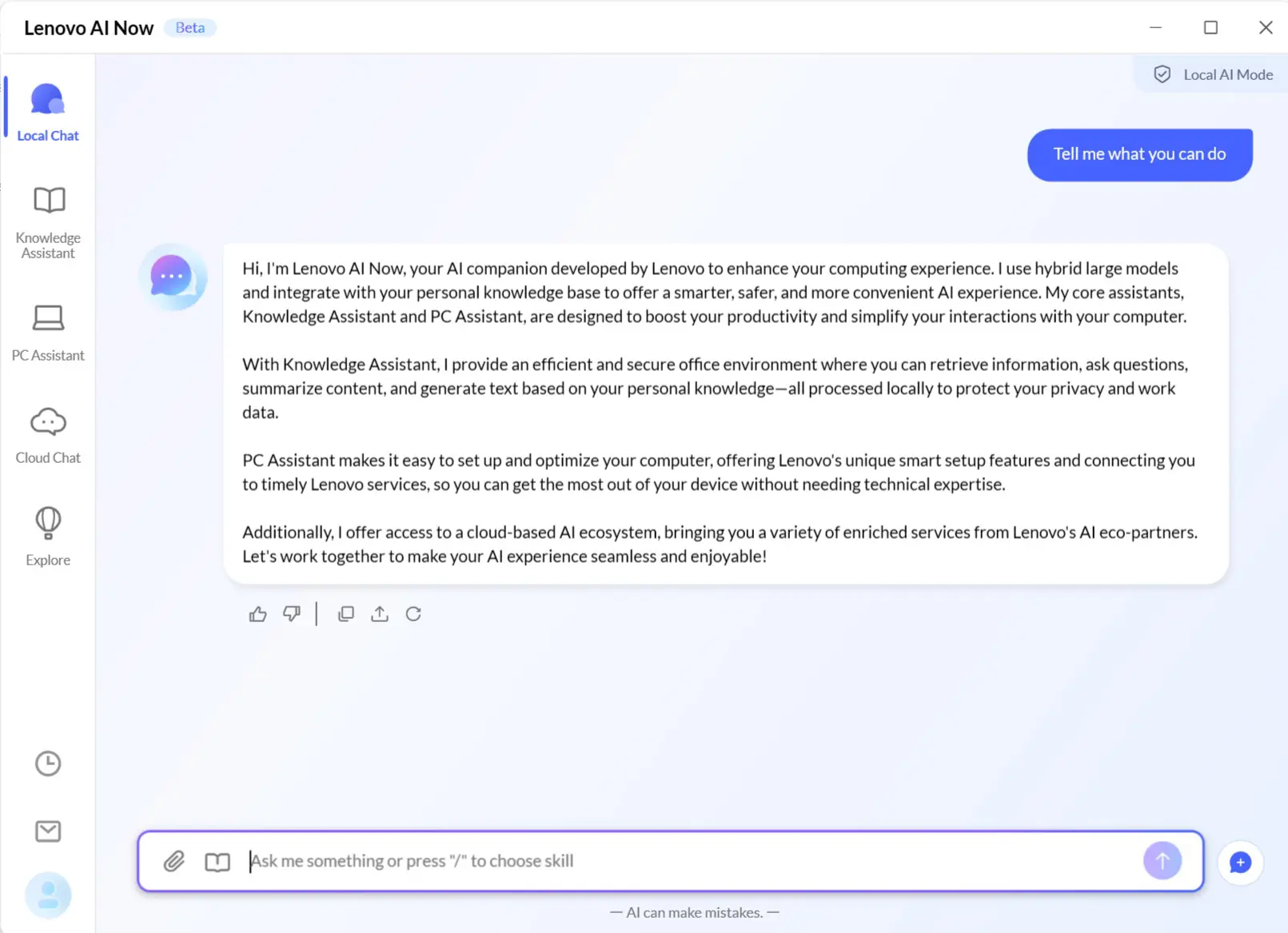
Sharing knowledge
We review the different menus of AI Now. The main windows are Local Chat and Knowledge Assistant. The names suggest that AI Now only speaks and understands English: asking questions in other languages makes little sense at this point. The current version of AI Now is not yet final, and Lenovo doesn’t hide this by putting Beta in the main bar. So keep in mind that you’re working with an imperfect product.
The local Now assistant can only chat about files you share with the tool, besides answering a few very general questions about itself. Via the Knowledge Base you create a library for AI Now. You can import different types of files, from Word documents to PDF files, spreadsheets, and presentations. AI Now will only search for information in files imported through the Knowledge Base.
Our conversations with AI Now had varying success. What you quickly notice is that AI Now doesn’t have the ability to think outside the box. If your questions are clearly formulated and sufficiently defined, the beta version of AI Now already works reasonably well.
In our Knowledge Base, we had various files, from notes from a roundtable on AI, PDF reports, interviews, internal spreadsheets to a personal document with travel information about Australia. We asked for a definition of AI or to give travel advice, and AI Now immediately knew in which file to search for the right information. The advantage of AI Now is that you don’t have to share the file with the cloud. You can clear your chat history in the settings.
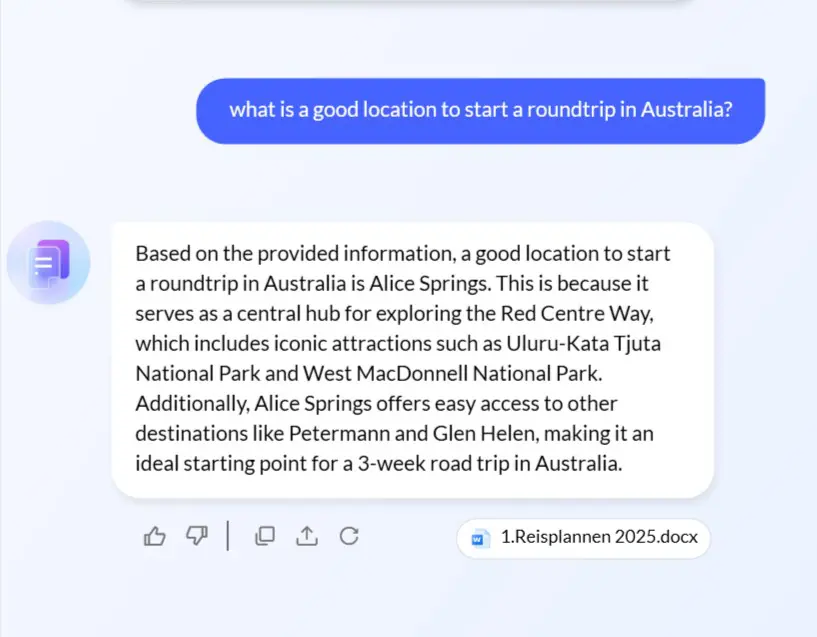
However, you shouldn’t expect complex analyses. The AI assistant is honest when it doesn’t have an answer and says in that case that it doesn’t have the necessary information to answer the question. We haven’t had a situation where AI Now just started making things up. In a disclaimer, Lenovo admits that errors are not excluded.
First Aid for IT
The third menu is PC Assistant. In this menu, you can ask questions about your device or Windows settings. Although Lenovo claims that AI Now can perform actions for you, in our experience, the tool is more advisory than executive.
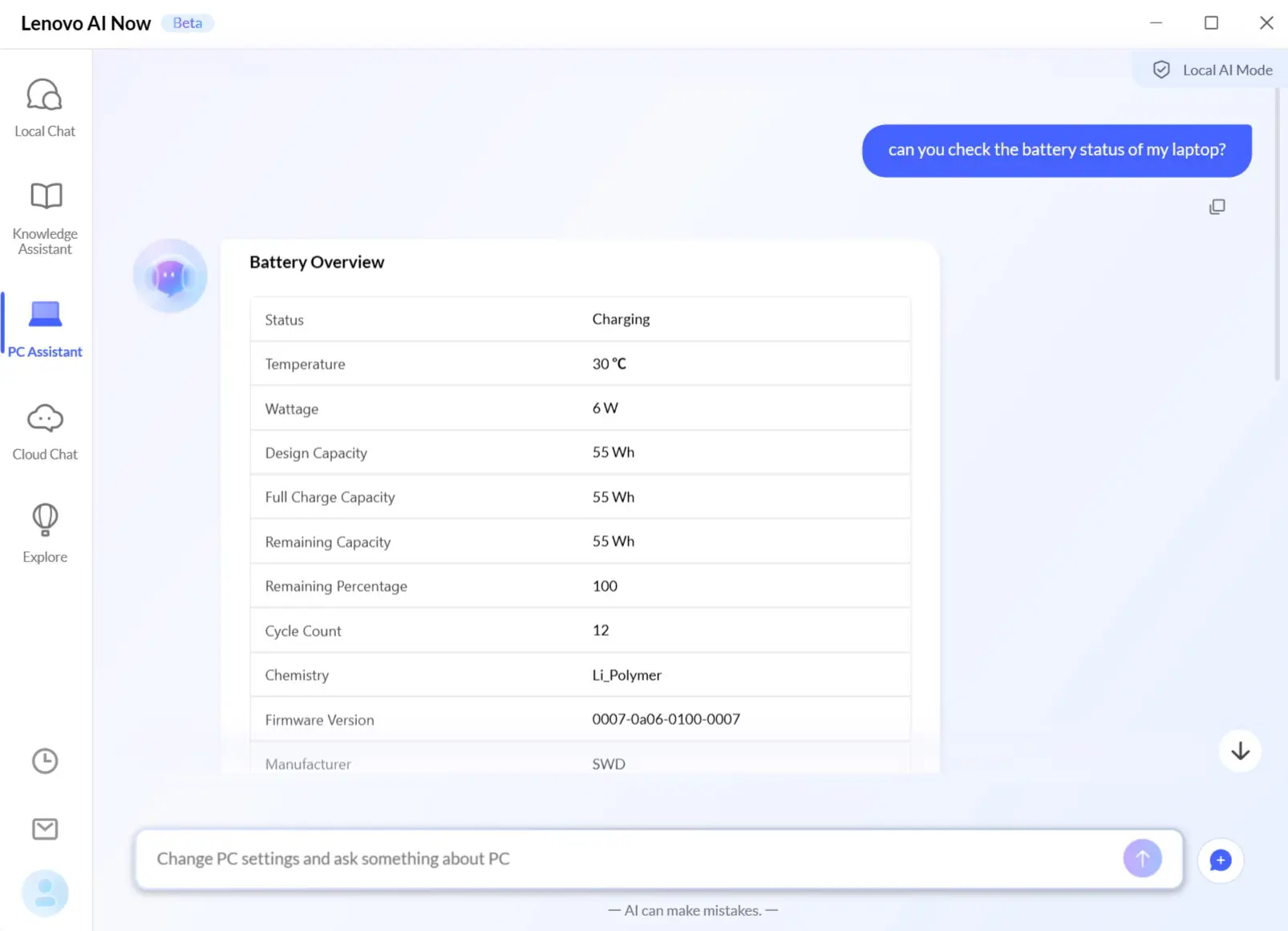
For example, you can look up information about your battery health. If we ask AI Now to adjust the screen brightness, we get presented with a step-by-step plan on how to do it ourselves. Be clear and direct again: a subtle hint that our eyes are hurting was not understood by AI Now.
For the Windows novice who gets lost in the settings, the PC Assistant can be handy. The more experienced user will find it faster themselves than first asking AI Now. For certain IT problems, such as a non-working webcam, AI Now can give you a hint in the right direction, but don’t expect it to have a magical solution for every problem.
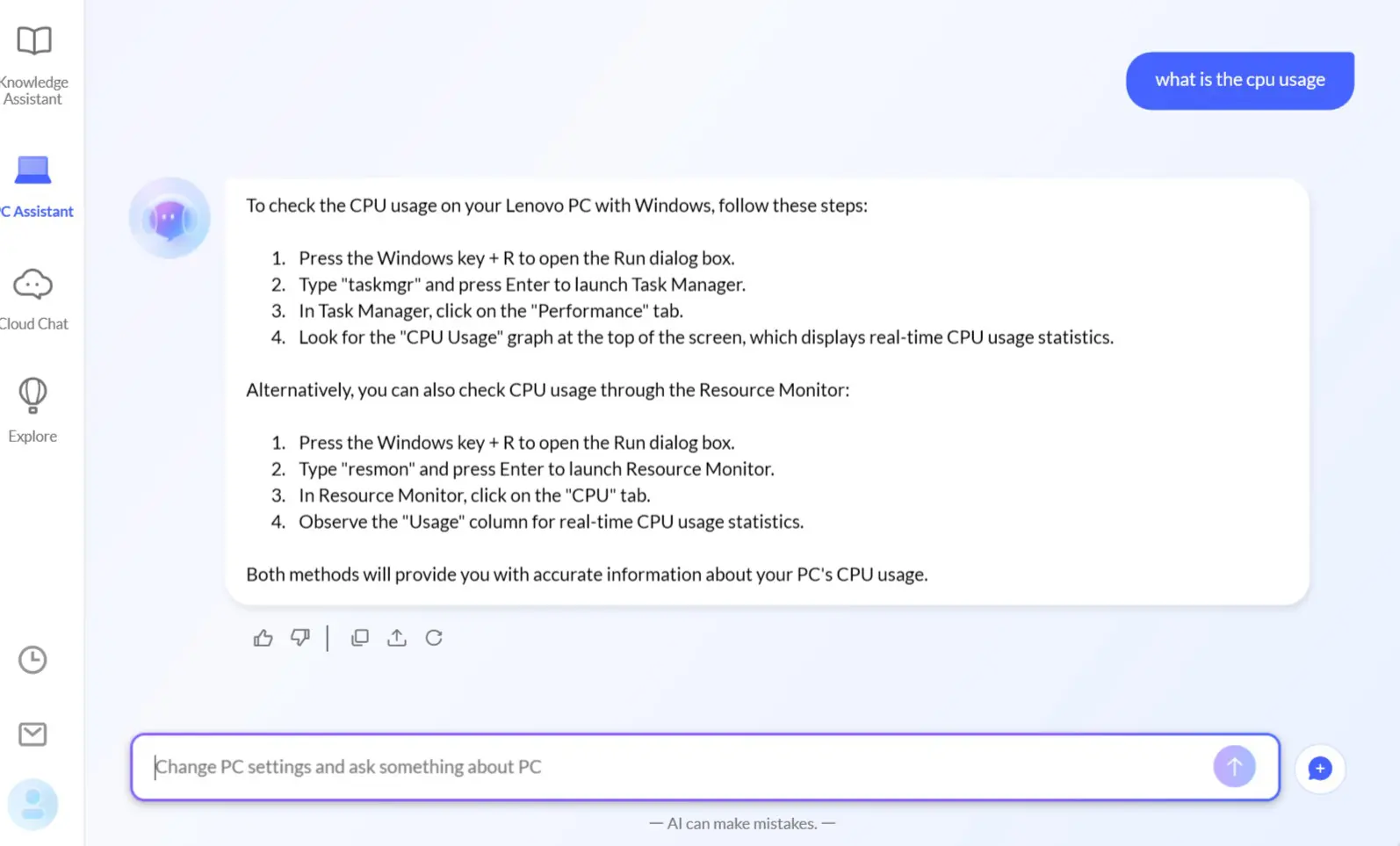
During a conversation, AI Now suddenly wanted to introduce us to Lena, Lenovo’s customer service chatbot. AI Now had even neatly looked up our laptop’s serial number for us. However, Lena is only accessible in the cloud and not available in the Benelux, so unfortunately she couldn’t help us further.
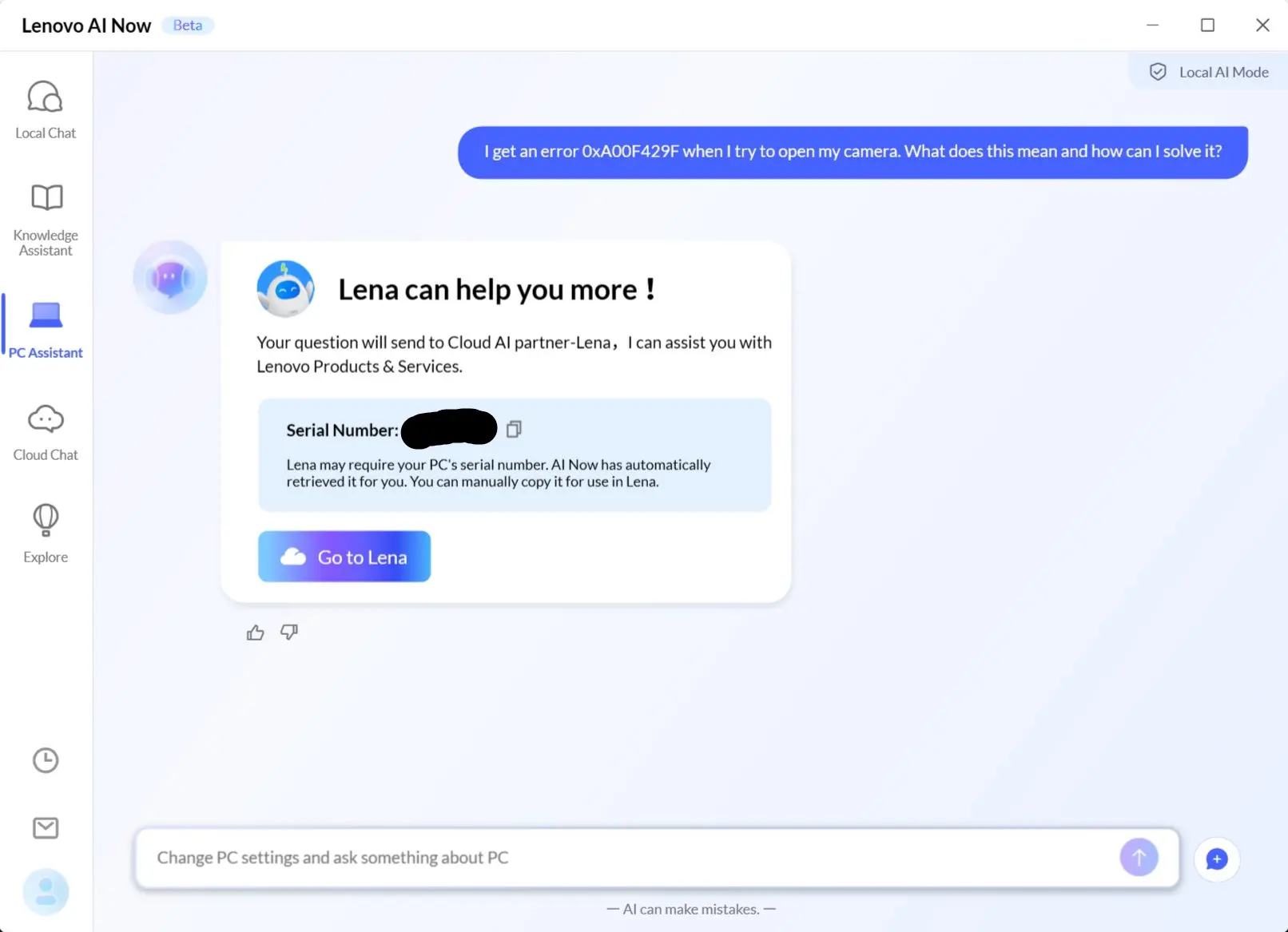
Sometimes to the cloud
The fourth and final menu is Cloud Chat, which is a cloud version of AI Now. If the local version doesn’t know, it almost always suggests asking its cloud brother. AI Now also looks into applications like Word and can explain text that you highlight. Via the cloud, it provides faster and more extensive answers, but it actually goes against Lenovo’s sales promise.
The reason to use a tool like AI Now is precisely because you wouldn’t need a cloud connection and subscription. By also offering AI Now via the cloud, Lenovo enters into direct competition with Microsoft. Most Lenovo laptops compatible with AI Now will also be compatible with Copilot. Currently, you can still use the cloud version for free, but in the long term, it will disappear behind a subscription model, making you just as well off with a paid subscription to ChatGPT or Copilot.

Promising, but still wet behind the ears
Lenovo AI Now is still in beta, and it shows. The tool shows flashes of potential, but at this stage, it’s a search for what and how to use it. The questions that AI Now can answer can be found without much effort by yourself.
The demand for local AI applications will grow among companies to keep their internal kitchen internal. Here, Lenovo potentially has an ace up its sleeve. Lenovo’s vision of what an AI PC should be has become a little clearer. AI Now is further along than HP AI Companion, but there’s still a lot of work to be done.
